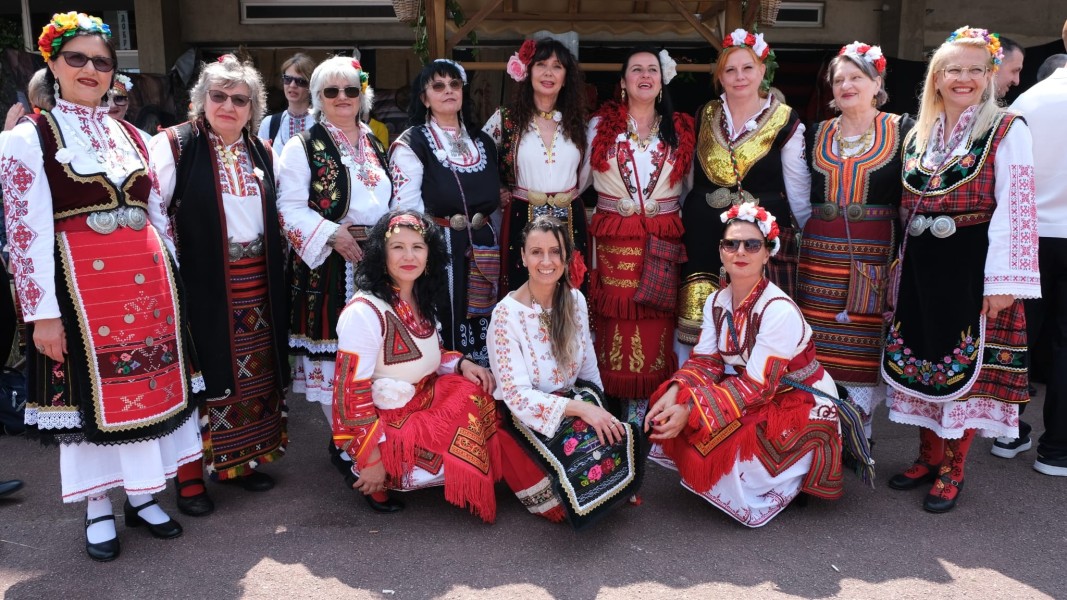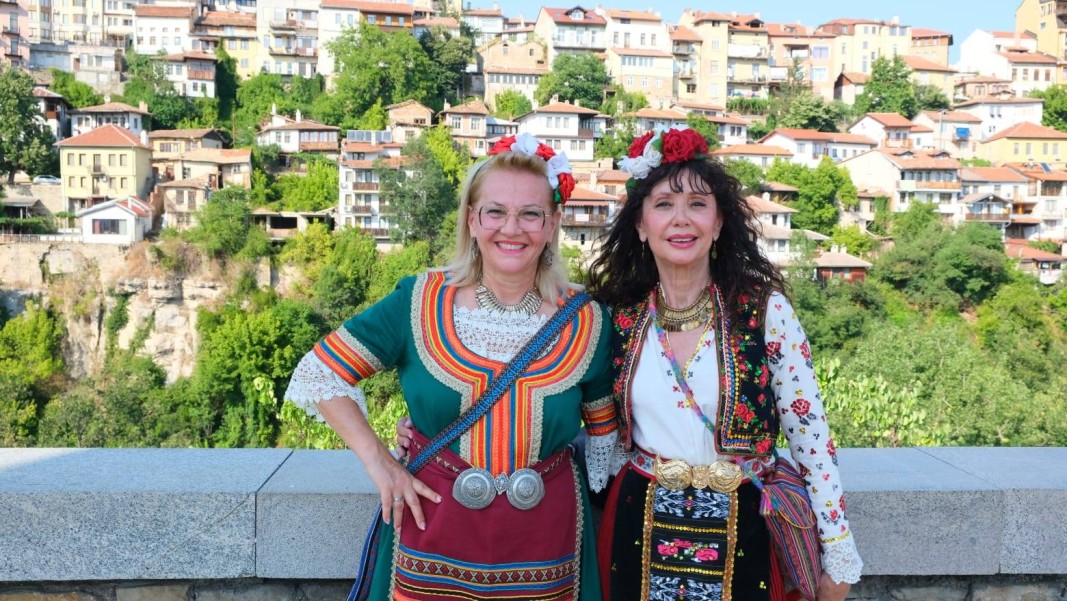The colourful performers from the 'White Roses' choir treated their home audience to a selection of their most well-known songs, including 'Pustono Ludo i Mlado', 'Shetala e Momata', 'Ogreyala Mesetshinka' and 'Sred Seloto'. An improvised rehearsal of the choir in Veliko Tarnovo was uploaded on Facebook.
'The selection in this case focuses on two-part folk songs, due to the smaller number of participants in the choir group," conductor Elena Dimitrova told Radio Bulgaria.
'We are a Bulgarian choir, but our vision is to include Italians who are interested in singing Bulgarian folk music. We also hope to form a dance group in the future. At the moment, all our singers are Bulgarian, coming from various regions of the country, united by their love for traditional folk songs.
Putting together a choir like this takes a great deal of work. I started with just a few singers. Our first song was the simple and well-known 'Sednalo e Jore', but since then we have progressed to more complex choral pieces. One example is Ya, izgrei sluntse (Rise, Sun), arranged by Atanas Iliev, which is especially challenging as it is written for five voices.

We still rehearse at my home twice a week. One rehearsal is dedicated to learning the vocal parts in sections and the other is a full choir session. My Italian husband, who is also a musician, helps me a great deal. He has even accompanied us on the organ during concerts. I usually arrange the music myself or sometimes he does it. As many of our performances are joint concerts with Italian choirs, we often have to coordinate with their repertoire and adapt to the nature of the event.
We always make a strong impression with our performances in Italy. Firstly, there are the costumes — people are drawn to them and often ask to take pictures with us. Then there's the music. We’ve noticed that Bulgarian folklore is appreciated around the world. Its rhythms and tempos are truly unique. This uniqueness makes us proud."
The name of the choir, White Roses (Rose Bianche), is no coincidence. It was inspired by the favourite song of Snezhana Toncheva, a Bulgarian athlete who spent the last years of her life in Pescara. Although she is no longer with us, the name of the choir honours her memory and her deep dedication to preserving Bulgarian culture and fostering unity among Bulgarians living abroad.
The White Roses choir is well known in Italy and frequently receives invitations to participate in concerts and cultural events. The choir’s conductor, Elena Dimitrova, carefully selects songs and lyrics that reflect the customs and traditions of Bulgaria’s past, focusing particularly on the relationships and values rooted in the traditional Bulgarian home.
'It’s a wonderful feeling to perform Bulgarian folk music on stage," says Tereza Atanasova, who organises the concerts and serves as the technical director of the White Roses choir. She shares her ambition to expand the project with a folk dance troupe based in Pescara:

'Our folk dances are beautiful. It was always a dream of mine to create a dance group, and that dream happened to align with Elena Dimitrova’s. The result of our shared vision is the choir we’re now proud to be part of. I’m not a great singer, but Elena is a magician — no matter how off-key we start, she finds a way to teach us. That’s why, when a Bulgarian woman comes to join us, she sings. There’s something so special about performing folk songs in front of an audience. Even in Veliko Tarnovo, we didn’t want to leave the stage. We wanted to share everything we’ve achieved in the field of folklore with our home audience."
'Of course, it hasn’t been easy. We went abroad to work. Everyone in the choir takes time from their limited free hours to come to rehearsals. The good thing is that Elena has opened her home to us, so we can meet at times that suit everyone."
As a choir, White Roses is a member of an international federation of over 1,200 choirs from around the world. Despite this diversity, they are regularly selected to perform at concerts throughout Italy. 'In fact, Tereza adds, because of our visit to Veliko Tarnovo, we had to turn down three performances in Italy. But for us, at this moment, Bulgaria comes first."
Photos: Facebook /Coro folkloristico bulgaro
A festive concert of the Otets Paissii Performing Folk Ensemble will be held in Nessebar today, as the ensemble celebrates 70 years since its establishment. The formation is the oldest Bulgarian folklore ensemble in the USA at the..
Ritual food is an integral part of the Bulgarian ritual system. In the calendar of a Bulgarian village more than a century ago, food with meat was rarely consumed. People usually ate meat 4-5 times a year - on Christmas, St. George’s..
At the end of the 19th century, the Czech artist and folklorist Ludvík Kuba travelled to Bulgaria with one goal in mind: to explore the country's rich song heritage. The melodies he collected were published in a separate volume of his Slavic Song..

+359 2 9336 661
